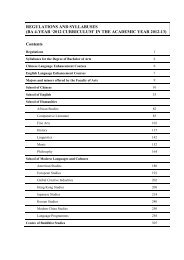Bachelor of Arts (BA) - The University of Hong Kong
Bachelor of Arts (BA) - The University of Hong Kong
Bachelor of Arts (BA) - The University of Hong Kong
Create successful ePaper yourself
Turn your PDF publications into a flip-book with our unique Google optimized e-Paper software.
291PHYSICSSecond/Third Year<strong>The</strong> Department <strong>of</strong> Physics <strong>of</strong>fers the following courses:-PHYS0001.Nature <strong>of</strong> the Universe I: Introduction to observational astronomy and the solarsystem (3 credits)This general education course is designed as an elective for students in all disciplines and all years. Noprior knowledge in astronomy, physics, and higher mathematics is required.<strong>The</strong> course focuses on the observational aspect <strong>of</strong> astronomy (including constellations and planets) andthe physics <strong>of</strong> our solar system. It also provides students with a basic understanding <strong>of</strong> the relationship<strong>of</strong> astronomy to life. Students are expected to participate actively in the night sky observations and fieldtrips.Prerequisite: Nil.Assessment: One 1-hour written examination (50% weighting) together with course work, field trips,laboratory work, and night sky observations (50% weighting).This course will be <strong>of</strong>fered in the first semester.PHYS0002.Nature <strong>of</strong> the Universe II: Stars, galaxies and cosmology for beginners (3 credits)This general education course is designed as an elective for students in all disciplines and all years. Itfocuses on the theoretical aspect <strong>of</strong> astronomy. No prior knowledge in astronomy, physics, or highermathematics is required.Topics covered include our own Sun, stars and their evolution, galaxies, blackholes, and cosmology. Itwill also provide students with a basic understanding <strong>of</strong> how our nature works on the macroscopic level.Prerequisite: Nil.Assessment: One 1-hour written examination (50% weighting) together with course work, field trips,laboratory work, and night sky observations (50% weighting).This course will be <strong>of</strong>fered in the second semester.PHYS0601.God, the big bang and Stephen Hawking I (3 credits)This course, named after a recently published book by David Wilkinson, is for both science andnon-science students to recognize the absence <strong>of</strong> any real conflict between science and religion. Thiscourse (part I) deals with religion and its interactions with cosmology.<strong>The</strong> universality <strong>of</strong> religious belief. Understanding different belief systems. Natural theology.Metaphysics. <strong>The</strong> methodology <strong>of</strong> science. Presuppositions and limitations <strong>of</strong> science. Scienceapplied to origins. An overview <strong>of</strong> relativity and quantum physics. Aristotelian cosmology.Copernican cosmology, <strong>The</strong> Galileo affair. Kantian cosmology. Big bang cosmology. <strong>The</strong>cosmological argument for God's existence. Stephen Hawking's contributions to space-time theory.<strong>The</strong> Hartle-Hawking "no boundary" proposal. Stochastic inflation models. Complimentarity. Genesisone.Prerequisite: Nil.Assessment: 100% continuous assessment including an essay, homework and web-based tests.This course will be <strong>of</strong>fered in the first semester.
















